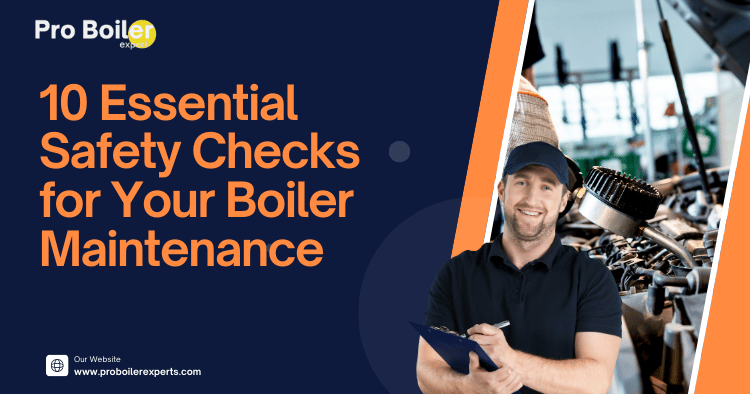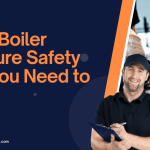Table of Contents
- Introduction
- 1. Inspect the Pressure Relief Valve
- 2. Check the Thermostat Settings
- 3. Examine the Flue System
- 4. Test the Low Water Cut-Off
- 5. Inspect Boiler Controls and Safety Devices
- 6. Assess the Boiler Water Quality
- 7. Clean the Boiler and Surrounding Area
- 8. Ensure Adequate Ventilation
- 9. Check for Fuel Leaks
- 10. Schedule Professional Inspections
- Conclusion
- FAQs
Introduction
Maintaining your boiler is crucial for ensuring it operates efficiently and safely. Regular safety checks prolong the life of your boiler and protect your home and loved ones. In this article, we’ll walk you through 10 essential safety checks that should be part of your boiler maintenance routine. By following these guidelines, you’ll minimize the risk of breakdowns or hazardous situations. Let’s dive in!
1. Inspect the Pressure Relief Valve
The pressure relief valve is a critical safety feature designed to prevent excessive pressure buildup within your boiler. To inspect it:
- Check for Leaks: Look for any signs of water leaking from the valve. A leak could indicate a malfunction, requiring immediate attention.
- Test the Valve: Open the valve slightly to release a small amount of water. If it doesn’t operate smoothly or leaks continuously, it’s time for a replacement.
For more detailed information on pressure relief valves, visit the U.S. Department of Energy.
2. Check the Thermostat Settings
Your boiler’s thermostat controls its operation and efficiency. Here’s how to ensure it’s functioning correctly:
- Calibrate the Thermostat: Use a thermometer to check if the thermostat reading matches the actual temperature. If there’s a discrepancy, recalibrate or replace it.
- Program Settings: Ensure your thermostat is programmed to match your heating needs, which can help save energy and costs.
Learn more about optimizing your thermostat settings at Energy.gov.
3. Examine the Flue System
The flue system is vital for venting harmful gases outside your home. Here’s how to check it:
- Look for Blockages: Ensure that there are no obstructions in the flue pipe, such as debris or nests. This can pose serious safety risks.
- Inspect for Damage: Check for any signs of corrosion or damage which could lead to leaks.
For in-depth guidance, refer to the National Fire Protection Association.
4. Test the Low Water Cut-Off
The low water cut-off is essential for preventing damage to your boiler. To test it:
- Check the Sensor: Inspect the sensor for any debris or buildup that could interfere with its operation.
- Perform a Functional Test: Manually lower the water level to ensure the cut-off activates properly.
Ensure you’re familiar with the specifics by visiting Boiler Safety.org.
5. Inspect Boiler Controls and Safety Devices
Your boiler’s controls and safety devices help monitor its performance. Check the following:
- Control Panel: Ensure all indicators and controls are functioning correctly.
- Safety Devices: Test the high-limit control and any other safety mechanisms to confirm they’re in working order.
For more information on boiler controls, check The Boiler Blog.
6. Assess the Boiler Water Quality
Maintaining the quality of the water in your boiler is crucial for its longevity:
- Check pH Levels: The ideal pH level for boiler water is typically between 7 and 9. Use a water testing kit to measure it.
- Look for Scale Buildup: Inspect for any signs of mineral buildup that could affect performance. If necessary, consider a water treatment solution.
For more on water quality, check out Water Quality Association.
7. Clean the Boiler and Surrounding Area
A clean boiler operates more efficiently and reduces hazards:
- Remove Dust and Debris: Regularly clean around the boiler and remove any flammable materials nearby.
- Clean Internal Components: If comfortable, open up the boiler and clean the burners and other components according to the manufacturer’s instructions.
Discover cleaning tips at HomeAdvisor.
8. Ensure Adequate Ventilation
Proper ventilation is essential for a safe boiler operation:
- Check Air Intake: Ensure that air intakes are unobstructed and allow for adequate airflow.
- Monitor Exhaust: The exhaust system should vent gases outside effectively without any blockages.
Learn more about boiler ventilation at the American Society of Heating, Refrigerating and Air-Conditioning Engineers.
9. Check for Fuel Leaks
Fuel leaks can lead to dangerous situations. Here’s how to check:
- Inspect Connections: Look for signs of leaks around fuel lines and connections.
- Smell for Gas: If you smell gas, evacuate the area immediately and contact a professional.
For safety tips, see Gas Safety.
10. Schedule Professional Inspections
While DIY checks are valuable, a professional inspection is essential:
- Annual Inspections: Schedule a yearly inspection with a certified technician to ensure everything is in top shape.
- Follow Recommendations: Be sure to follow the technician’s recommendations for repairs or replacements.
Find certified technicians through the National Association of Oil Heating Service Managers.
Conclusion
Regular safety checks for your boiler are essential for ensuring its efficiency and safety. By following these ten essential checks, you can help prevent costly breakdowns and hazardous situations. Remember that while some tasks can be performed by yourself, seeking professional help is always a wise choice for the more complex aspects of boiler maintenance.
FAQs
Q1: How often should I perform safety checks on my boiler?
A1: It’s recommended to perform safety checks at least once every month, with a more thorough inspection at least once a year.
Q2: What are the signs that my boiler needs maintenance?
A2: Signs include unusual noises, leaks, fluctuating temperatures, and an increase in energy bills.
Q3: Can I perform boiler maintenance myself?
A3: While many checks can be performed by homeowners, it’s crucial to hire a professional for complex tasks and annual inspections.
Q4: What should I do if I suspect a gas leak?
A4: Evacuate the area immediately and contact your gas supplier or emergency services.
For more detailed information, feel free to explore the links provided throughout the article. Stay safe and enjoy warm, efficient heating!
Also Look For
For more insights into boiler types and their maintenance, check out these resources:
- Top 5 Benefits of Choosing Combi Boilers for Your Home
- Top 5 Benefits of Choosing a System Boiler for Your Home
- Top 5 Benefits of Conventional Boilers for Your Home
- Essential Steps for Boiler Installation Certification Success
- Essential Boiler Maintenance Tips: Keep Your System Efficient
These links can provide additional information and tips relevant to maintaining your boiler efficiently and safely.





